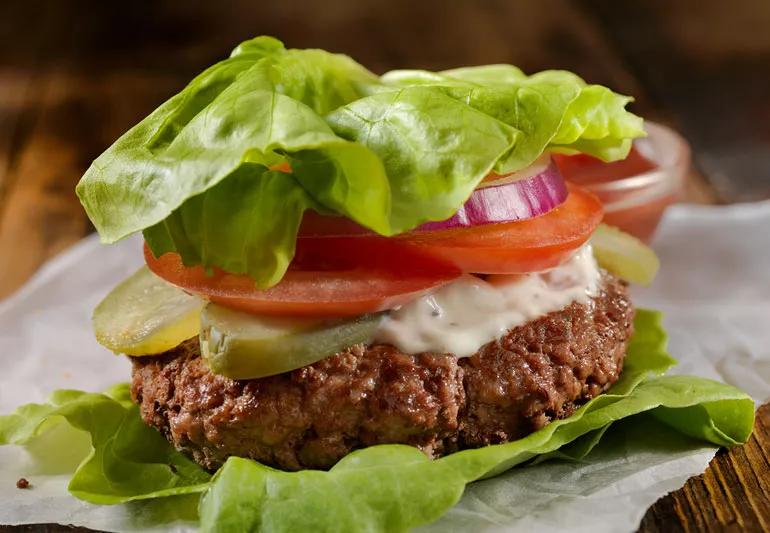A how-to guide to choosing the best ingredients

You don’t want to heat up the kitchen — or clean pots and pans. The solution? Fire up the grill and throw on some burgers for a quick meal with minimal fuss.
Advertisement
Cleveland Clinic is a non-profit academic medical center. Advertising on our site helps support our mission. We do not endorse non-Cleveland Clinic products or services. Policy
Keep in mind that the quality of your ingredients determines whether you’re serving a healthy meal to your family, or one that’s loaded in saturated fat and cholesterol. Follow these tips from preventive cardiology dietitian Julia Zumpano, RD, LD, for choosing the right buns, burgers, add-ins, toppings and condiments for your health.
Before you throw those burgers on the grill, consider this: What ingredients you choose — from buns, the burgers themselves, add-ins, toppings and condiments — determine whether you’re serving your family a healthy meal or one loaded with artery-clogging fats.
Skip the bulky Kaiser roll. Instead, give your burger a whole-grain foundation to benefit from the added fiber. Keep carbs low by opting for smaller mini pitas or sandwich thins. Or, go against the grain and simply wrap your burger in a lettuce leaf.
The following bases all have fiber, thiamin, manganese and selenium in them:
Burger persists may insist on beef, but a moderate intake of red meat is important for your cardiovascular health and to lower your risk of diabetes. If you do opt for beef, make sure it’s lean. Aim for two punch patties for mini burgers or 4 ounces (vs. the standard 6 ounces) for a regular burger.
Advertisement
Want an easy way to boost flavor without extra calories? Sprinkle in the seasonings. You can customize your burger with any blends of herbs and spices your heart desires. But if you don’t mix your own, make sure to choose a low-sodium store-bought blend.
Your toppings can make or break a burger, both tastewise and nutritionally. Don’t pile on the bacon (which is high in cholesterol and saturated fat). If you decide to indulge, try limiting yourself to one piece — or use leaner turkey bacon.
Complex toppings aren’t for everyone. But if you’re not against having fun with nontraditional flavors, you’ll never grow bored — and boost your burger’s nutrient profile!
When considering your condiments, skip the saturated-fat laden mayo. If you truly can’t resist, use reduced-fat mayo, and just one tablespoon. Also, make sure your ketchup doesn’t contain high-fructose corn syrup, which can lead to insulin resistance, obesity, type 2 diabetes and high blood pressure.
To help you cut back on fat and calories when ordering hamburgers, do the following:
Advertisement

Sign up for our Health Essentials emails for expert guidance on nutrition, fitness, sleep, skin care and more.
Learn more about our editorial process.
Advertisement

This color additive, found in many pre-packaged foods, may affect people with ADHD or allergies

With a focus on internal cues for hunger and fullness, this eating style may revolutionize your relationship with food

Review the ingredients, watch for sugar and fat, and choose one with the right amount of protein for your needs

Getting the hang of portions can help you better understand how much to put on your plate

A typical recommended balanced diet is half fruits and veggies, a quarter protein and a quarter grains

Foods high in protein, fiber and water can help keep hunger at bay

This quirky food trend is harmless, as long as you’re getting enough protein, fiber and healthy fats

With a little planning, you can fill your belly and boost your energy

Even small moments of time outdoors can help reduce stress, boost mood and restore a sense of calm

A correct prescription helps your eyes see clearly — but as natural changes occur, you may need stronger or different eyeglasses

Both are medical emergencies, but they are very distinct events with different causes